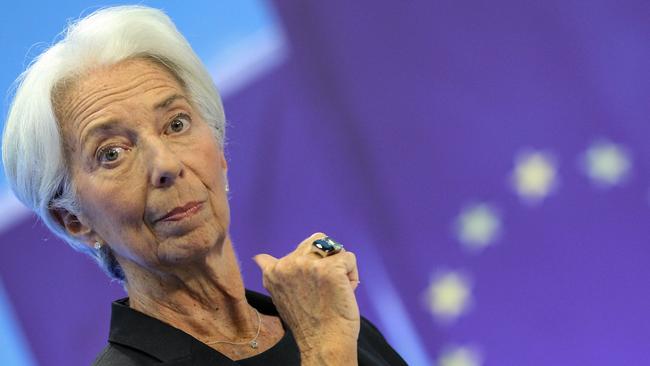ECB’s historic 75 basis point rate hike kickstarts aggressive inflation action
The record 75 basis points rate increase comes with an ECB warning that inflation is spreading beyond energy and the bank stands ready to move aggressively over the next several meetings.

The European Central Bank raised interest rates by the largest amount since the early days of Europe’s currency union, moving aggressively to combat record inflation even as an energy crisis puts Europe on the brink of recession.
The bank said in a statement that it would increase its key rate by 0.75 per cent – its second hike this year following a 50-basis-point rise in July – and signalled that further rises were likely over the coming months.
At a news conference, ECB President Christine Lagarde warned that inflation was spreading beyond energy to a range of products. She said the ECB was ready to increase rates aggressively over the next several meetings.
“We want all economic actors to understand that the ECB is serious” about combating high inflation, Ms Lagarde said.
The euro slid to about US99.7c against the US dollar after the ECB’s decision, and investors dumped European government bonds while Ms Lagarde was speaking as they moved to price in more interest-rate increases in the months ahead.
The unusually large increase mirrors recent moves by other major central banks, including the Federal Reserve, which is expected to unveil a third successive 0.75-point rate rise later this month.
Canada’s central bank raised its policy rate this week by 0.75 percentage point to 3.25 per cent, a 14-year high.
Australia’s rate has also been increased by 50 basis points to 2.35 per cent.
The ECB is in a tougher position than its North American counterparts because Europe’s economy is being hit harder by the war in Ukraine.
Inflation in the 19-nation eurozone has surpassed US levels in recent weeks as Russia’s throttling of energy supplies to Europe has driven up prices.
Rising borrowing costs will likely increase the risk of a slide into recession for Europe, whose households and businesses are wrestling with surging costs and sagging confidence. With governments piling on debt to shield consumers and businesses from the economic fallout, a national election in Italy later this month could exacerbate strains in the region’s bond markets.
“I thought the language they used around inflation was really quite hawkish,” said Simon Bell, a portfolio manager at Legal & General Investment Management.
Still, Mr. Bell doesn’t expect 75-basis-point rate increases to become the norm for the ECB as policy makers likely remain concerned about the stability of financially fragile eurozone members like Italy.
Eurozone inflation increased to 9.1 per cent in August and is expected to rise toward 10 per cent over the coming months, as some government energy and public-transport subsidies expire, especially in Germany.
Despite that, the ECB’s policy rate is significantly below those of other major central banks, including the Fed, which is expected to increase its benchmark rate later this month to a range between 3 per cent and 3.25 per cent.
The ECB has moved more cautiously because the eurozone’s economic recovery during the Covid-19 pandemic has been relatively slow, and officials initially expected inflation to decline this year. They also worry about how higher borrowing costs would affect weaker economies in Southern Europe.
“Better late than never,” said Clemens Fuest, president of the Munich-based Ifo think tank, of the ECB’s policy decision. He warned that delaying interest-rate hikes because of an expected economic downturn would only push up the cost of combating inflation in future.
Ms Lagarde said the ECB wasn’t yet ready to start reducing its multi-trillion-dollar holdings of government debt, which the Fed has been doing since June. The ECB amassed those bonds during a years-long effort to combat ultralow inflation.
Comparing the ECB’s policies with those of the Fed, Ms Lagarde underlined the more robust state of the US economy.
“When you look at the labour market … we see a US market which is … red hot,” she said.
While unemployment is also historically low in Europe, economists see few signs that the eurozone economy is overheating.
Instead, eurozone inflation is being driven primarily by soaring energy prices and persistent supply bottlenecks, which the ECB can do little to solve.
Ultimately, energy and food prices, and government interventions to shield energy users from some of the pain, will have a much bigger impact on inflation and the depth of the looming recession than the ECB’s policies, said Holger Schmieding, chief economist at Berenberg Bank in London.
– The Wall Street Journal



To join the conversation, please log in. Don't have an account? Register
Join the conversation, you are commenting as Logout